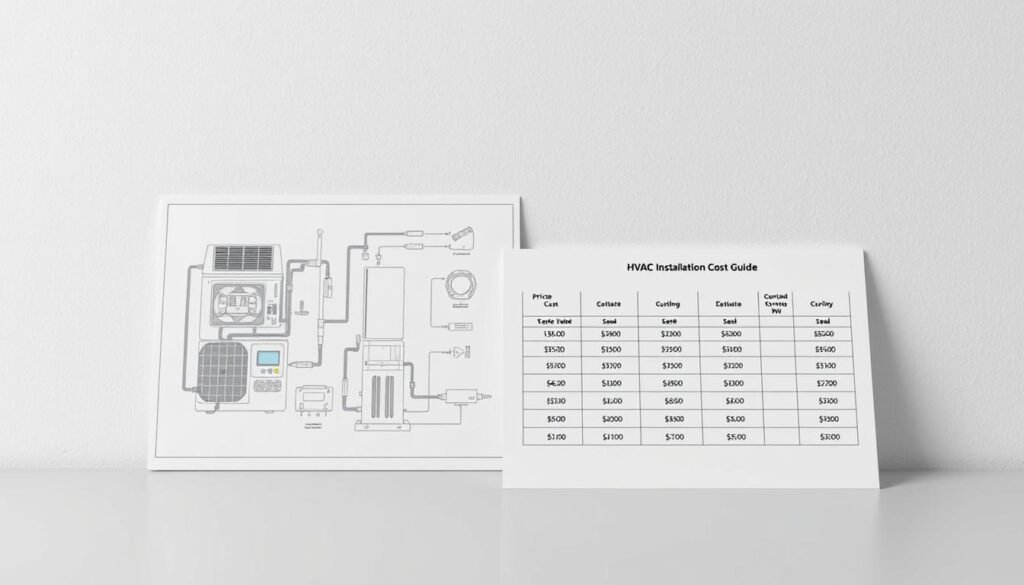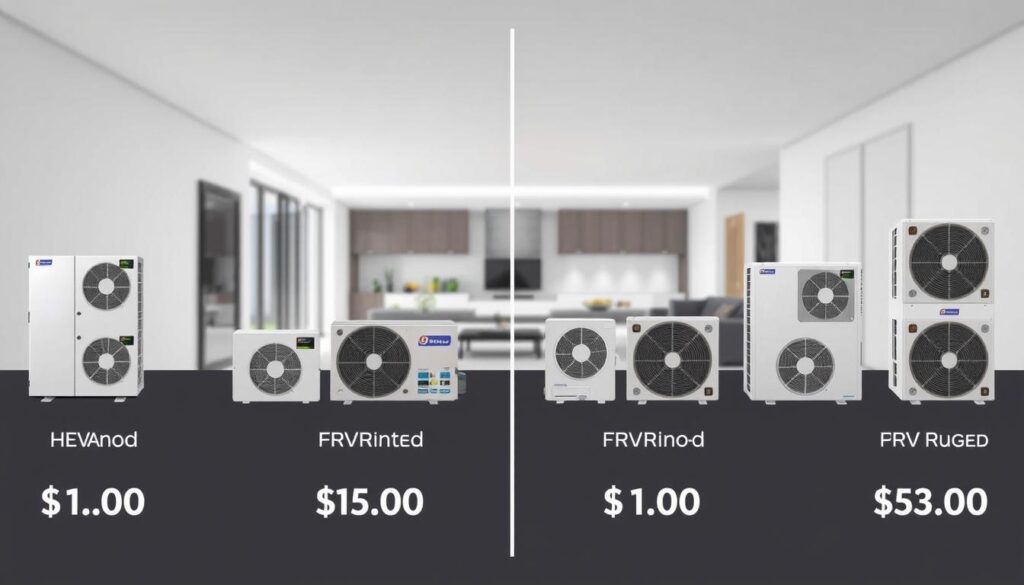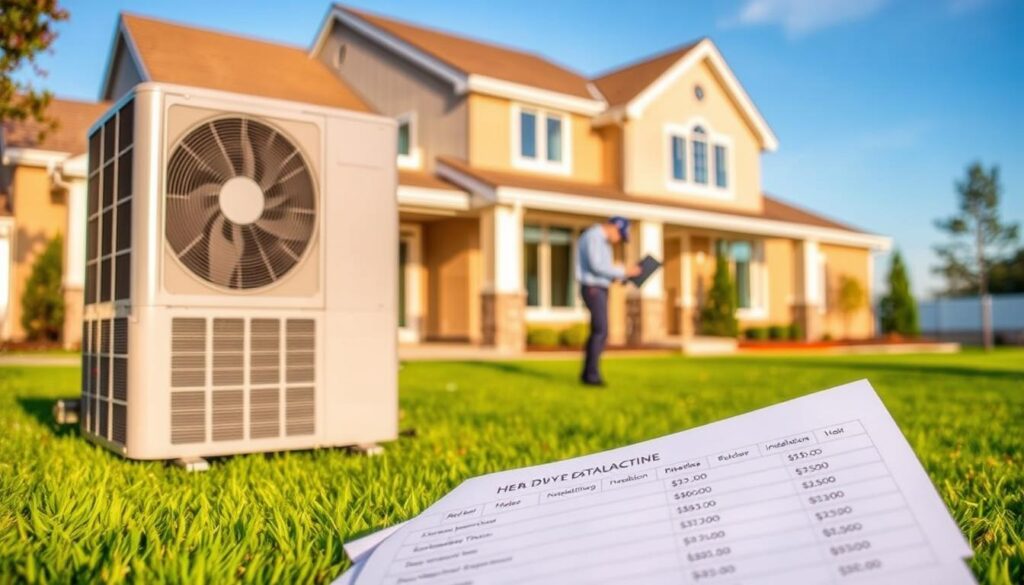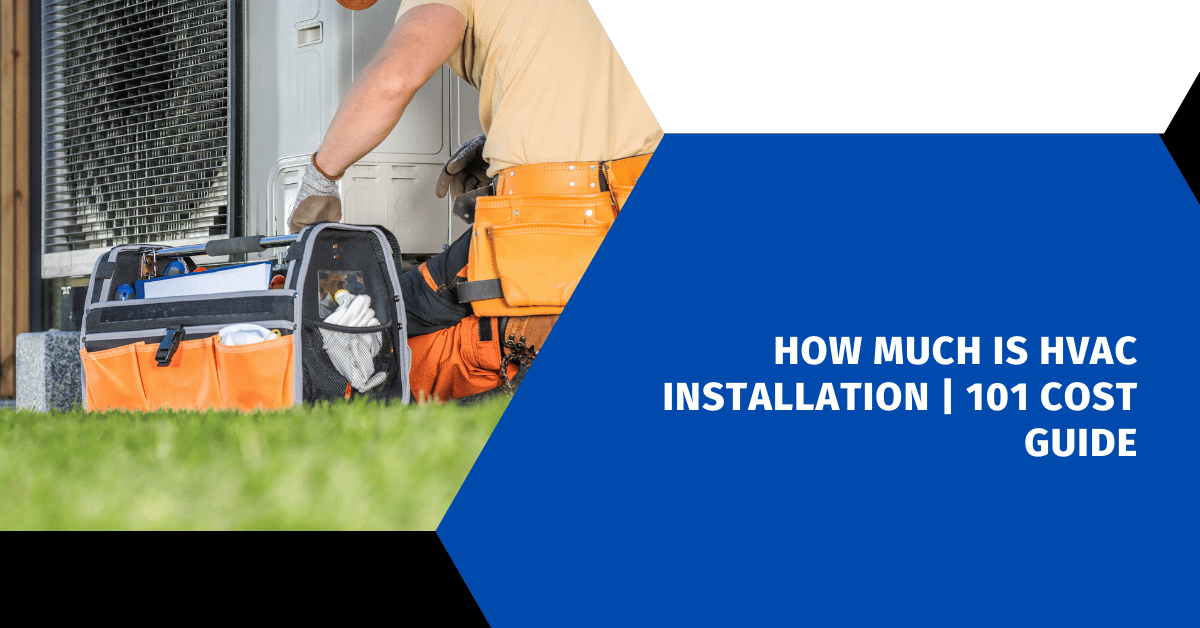Affiliate Disclosure
HVAC Guide Guys is a participant in the Amazon Services LLC Associates Program, an affiliate advertising program designed to provide a means for sites to earn advertising fees by advertising and linking to Amazon.
How Much Is HVAC Installation? Are you curious about the cost of HVAC installation? Figuring out the price for a comfortable home can seem tricky. It’s like trying to find your way through a maze of prices and choices.

HVAC installation costs usually fall between $2,500 and $7,500. But, the exact price depends on a few important things. Your home’s size, how efficient the system is, and your local weather all affect the final cost.
This guide will help you understand HVAC installation costs better. We’ll look at the main factors that influence prices. This way, you can make a smart choice for your home’s comfort system.
Key Takeaways
- Average HVAC installation costs range from $2,500 to $7,500
- Factors like home size and system efficiency significantly impact pricing
- Professional installation ensures optimal system performance
- Energy-efficient systems can provide long-term cost savings
- Regional climate influences HVAC system selection and cost
Table of Contents
Understanding HVAC Installation Basics
Getting into HVAC system installation can be tricky. The cost of installing your HVAC system at home depends on several things. These include the type of system, your home’s size, and what you need. Knowing the basics helps you choose the best for your home’s comfort and energy use.
There are many HVAC systems for homeowners to choose from. Let’s look at the main ones:
- Central Air Conditioning: Great for cooling your whole house
- Heat Pumps: Good for both heating and cooling
- Ductless Mini-Split Systems: Allows for different temperatures in different rooms
- Furnace Systems: A classic choice for heating
Key Components of HVAC Installation
The cost of your HVAC system installation changes based on a few key parts:
- Outdoor Condensing Unit
- Indoor Air Handler
- Ductwork
- Thermostat
- Refrigerant Lines
Professional vs DIY Installation Considerations
While DIY might save money, hiring a pro has big benefits:
- Expertise in system sizing
- Correct setup of equipment
- Warranty coverage
- Ensures safety
Professional installation means your HVAC system works better and lasts longer.
Choosing the right installation method can save you money and avoid problems later with your home’s heating and cooling.
Explore Our HVAC Shop
Looking for top-rated HVAC tools, parts, and accessories? Visit our shop and find the perfect solution for your needs.
Visit the ShopAverage HVAC Installation Costs Breakdown
Knowing the average cost for HVAC installation helps you plan your budget. The price of HVAC systems changes based on several important factors.
The cost for replacing your HVAC system varies by type:
- Central Air Conditioning: $3,000 – $7,500
- Furnace Installation: $2,500 – $6,000
- Heat Pump Systems: $3,000 – $10,000
Let’s look at the main cost parts:
| System Type | Equipment Cost | Labor Cost | Total Average Cost |
|---|---|---|---|
| Central Air Conditioner | $2,000 – $5,000 | $1,000 – $2,500 | $3,000 – $7,500 |
| Furnace | $1,500 – $4,000 | $1,000 – $2,000 | $2,500 – $6,000 |
| Heat Pump | $2,000 – $7,000 | $1,000 – $3,000 | $3,000 – $10,000 |
“Investing in the right HVAC system can save you money in the long run through improved energy efficiency.” – HVAC Industry Expert
Your exact cost will depend on your home’s size, the system’s complexity, and local labor rates. Always get quotes from certified pros to find the best deal.
Factors Affecting HVAC Installation Pricing
Knowing what affects hvac contractor installation fees helps you choose wisely. Installing a new HVAC system is more than just a cost. It’s about making a smart investment.
Many important factors influence the cost of installing a commercial HVAC system:
- Home Size and Layout: Bigger homes need stronger systems, which raises costs
- System Efficiency Ratings: More efficient units cost more but save money in the long run
- Regional Climate Considerations: Your area’s weather affects what system you need
- Installation Complexity: Unique homes can make installation harder and more expensive
Home Size and Layout Impact
Your home’s size and design are key in choosing an HVAC system. Bigger homes need stronger units, which means higher costs. Homes with complex layouts can also make installation harder.
System Efficiency Ratings
Energy efficiency is a big deal when it comes to HVAC costs. Units with higher SEER ratings cost more upfront but save you money over time by using less energy.
Regional Climate Considerations
Your local weather plays a big role in HVAC costs. Places with very hot or cold weather need stronger systems. This can make installation more expensive.
Labor and Installation Complexity
Installing an HVAC system is more than just putting in new equipment. Things like ductwork changes, electrical work, and structural issues can add to labor costs. Experienced HVAC pros consider these factors to give you a fair price.
Explore Our HVAC Shop
Looking for top-rated HVAC tools, parts, and accessories? Visit our shop and find the perfect solution for your needs.
Visit the ShopHow Much Is HVAC Installation By System Type

Knowing the cost of HVAC installation for different systems helps you choose the right one for your home. Each system has its own price tag, affecting your total cost.
Looking into HVAC installation costs, you’ll see big differences between systems. Here’s a look at the main types:
- Central Air Conditioning Systems
- Heat Pump Systems
- Furnace Installations
- Ductless Mini-Split Systems
| HVAC System Type | Average Installation Cost Range | Best Suited For |
|---|---|---|
| Central Air Conditioning | $3,500 – $7,500 | Entire Home Cooling |
| Heat Pump | $3,000 – $10,000 | Heating and Cooling |
| Furnace | $2,500 – $6,000 | Winter Heating |
| Ductless Mini-Split | $2,000 – $5,500 | Targeted Room Comfort |
The cost of your HVAC installation depends on several factors. These include your home’s size, the system’s efficiency, and local labor costs. Getting a professional assessment is key to getting an accurate price.
Pro Tip: Always get multiple quotes from certified HVAC professionals to ensure competitive pricing and quality installation.
Central Air Conditioning Installation Costs
Getting a central air conditioning system is a big deal for homeowners. It’s about comfort and saving energy. The cost can change a lot based on several important things. Knowing these helps you choose the best and most affordable option.
There are two main types of central air systems: standard and high-efficiency. Each has its own price and benefits.
Standard vs High-Efficiency Units
Standard units are cheaper upfront but might cost more to run. High-efficiency units are more expensive at first but save money in the long run.
- Initial cost range: $3,000 – $5,500
- Energy efficiency ratings (SEER): 13-16 for standard units
- Energy efficiency ratings (SEER): 17-26 for high-efficiency units
“Investing in a high-efficiency unit can save you up to 50% on cooling costs,” says energy efficiency expert Mark Rodriguez.
Ductwork Requirements
Your home’s ductwork is key for installing central air. Some homes need new ducts, which can raise the total cost.
- Ductwork inspection costs: $300 – $500
- Full ductwork replacement: $1,500 – $3,000
- Sealed and insulated duct systems: Additional 20-30% cost
Installation Labor Expenses
Labor costs are a big part of the total cost. Getting it done right means your system works better and lasts longer.
- Average labor costs: $500 – $2,500
- Complex installations: Up to $3,500
- Factors affecting labor: Home size, system complexity, location
Pro tip: Always get multiple quotes and check the contractor’s credentials to get the best deal for your central air system.
Explore Our HVAC Shop
Looking for top-rated HVAC tools, parts, and accessories? Visit our shop and find the perfect solution for your needs.
Visit the ShopHeat Pump System Installation Pricing

Thinking about getting a heat pump for your home? It’s important to know the costs. Quotes for professional installation usually fall between $3,000 and $10,000. This price depends on several factors, including the type of heat pump and your home’s needs.
Heat pumps are mainly of two types:
- Air Source Heat Pumps: These are cheaper and simpler to install
- Ground Source (Geothermal) Heat Pumps: They cost more upfront but save more energy
Several things affect the installation price:
- System size
- Home size
- Local weather
- Current setup
“Choosing the right heat pump can cut down your energy bills over time,” says energy expert Mark Thompson.
The cost for your installation will depend on the project’s complexity. A basic air-source heat pump for a typical home might be $4,500 to $8,000. Geothermal systems, needing more ground work, can be $10,000 to $25,000.
To get a precise quote, book a visit with a certified HVAC contractor. They can give you a detailed estimate based on your home’s needs.
Ductless Mini-Split Installation Expenses
Ductless mini-split systems are great for keeping your home comfortable. Knowing the costs can help you choose the right system for your needs.
There are two main types: single-zone and multi-zone systems. Each has its own price and benefits.
Single Zone vs Multi-Zone Costs
Single-zone systems cost between $2,000 and $4,000. They’re good for small spaces or specific areas. Multi-zone systems, which can cool or heat multiple rooms, cost between $4,000 and $7,500.
- Single-zone system average cost: $2,000 – $4,000
- Multi-zone system average cost: $4,000 – $7,500
- Cost per additional indoor unit: $500 – $2,000
Indoor Unit Placement Factors
Where you put your indoor units affects the cost. Things like wall space, room layout, and how easy it is to get to them matter.
- Wall-mounted units: Most common and cost-effective
- Ceiling cassette units: More expensive but provide better air distribution
- Floor-mounted units: Ideal for rooms with limited wall space
Outdoor Unit Considerations
Where you put your outdoor unit is key for efficiency. Experts will look at your property to find the best spot. This can change the installation cost.
Getting a pro to install it right ensures it works well. This also helps it last longer.
Energy Efficiency and Long-Term Cost Savings
Getting an energy-efficient HVAC system can cut down your costs over time. Today’s systems save money thanks to new tech and design.
It’s important to know about energy efficiency ratings when looking at hvac costs. Two main ratings help you choose:
- SEER (Seasonal Energy Efficiency Ratio) – Shows cooling efficiency
- AFUE (Annual Fuel Utilization Efficiency) – Measures heating performance
Higher ratings mean less energy use. A SEER of 16 or more can lower cooling costs by up to 40% compared to old systems. Smart thermostats and zoning systems also help save energy.
Here are ways to save money in the long run:
- Choose high-efficiency HVAC equipment
- Keep your system well-maintained
- Use programmable thermostats
- Seal and insulate your ductwork
Even though energy-efficient systems cost more upfront, they save you money on bills. Plus, you might get tax breaks, making them a wise choice for eco-friendly homes.
Explore Our HVAC Shop
Looking for top-rated HVAC tools, parts, and accessories? Visit our shop and find the perfect solution for your needs.
Visit the ShopGovernment Rebates and HVAC Incentives
Getting affordable hvac installation services is now easier thanks to government programs. These programs help lower your costs and encourage energy-saving solutions.
In the United States, there are many rebate programs for homeowners and businesses. These incentives push for energy-saving technologies and cut down on carbon emissions.
- Federal Tax Credits: Homeowners can claim credits for qualifying energy-efficient HVAC installations
- State-Level Rebate Programs: Many states offer additional financial incentives
- Utility Company Discounts: Local utility providers often provide cash-back programs
“Investing in energy-efficient HVAC systems can lead to substantial long-term savings and environmental benefits.”
To save more, follow these steps:
- Research federal tax credit eligibility
- Check state-specific rebate programs
- Contact local utility companies for possible discounts
- Verify system efficiency ratings
| Incentive Type | Potential Savings | Qualification Criteria |
|---|---|---|
| Federal Tax Credit | Up to $500 | Energy Star certified systems |
| State Rebates | $100-$1,500 | High-efficiency equipment |
| Utility Discounts | $50-$800 | Energy-efficient upgrades |
Pro tip: Always keep documentation of your HVAC installation to streamline the rebate application process.
Conclusion
Figuring out the cost of HVAC installation involves looking at several factors. Your home’s specific needs, the local climate, and your energy goals are key. Getting professional quotes helps you make informed decisions.
Choosing a top-notch HVAC system is a big deal. It’s not just a purchase; it’s a long-term promise to your home’s comfort and energy use. By looking at different systems, their efficiency, and possible government help, you can find a balance between cost and savings.
When you’re looking for HVAC quotes, choose contractors who do thorough assessments. They can suggest the best options for your budget, home design, and local weather. A smart investment today means more savings and comfort for your home in the future.
Embarking on the HVAC installation journey requires research, planning, and expert advice. With the right steps, you’ll make your home cozy and efficient. This approach ensures your home’s energy use and system performance are top-notch.

